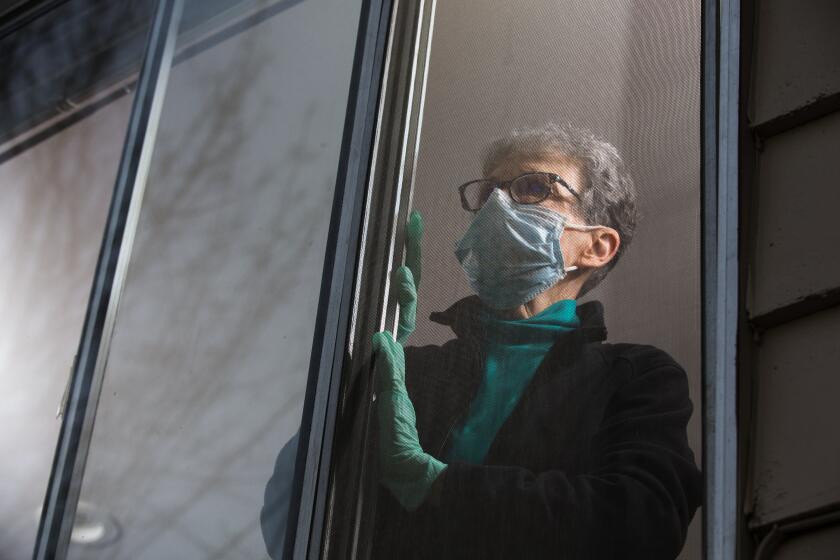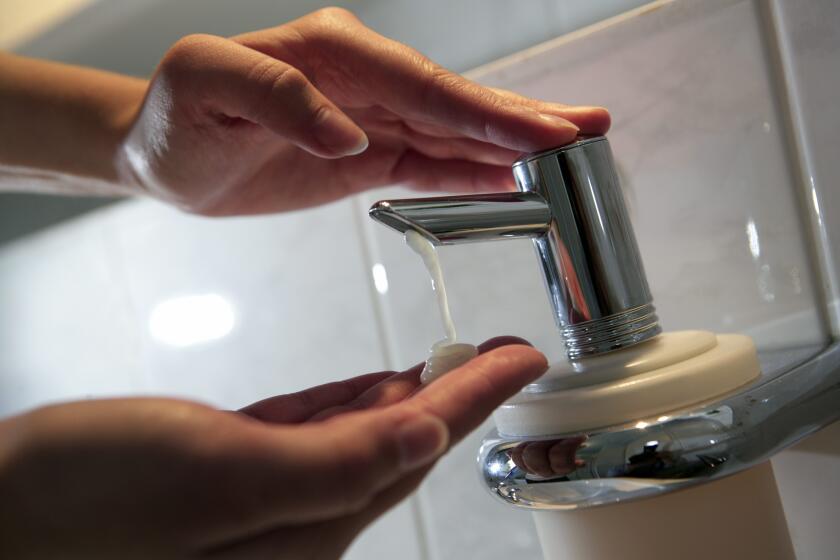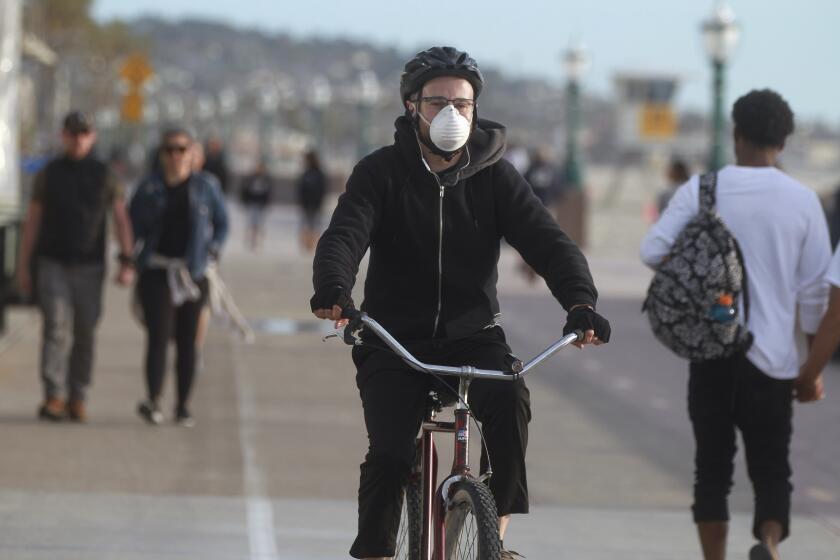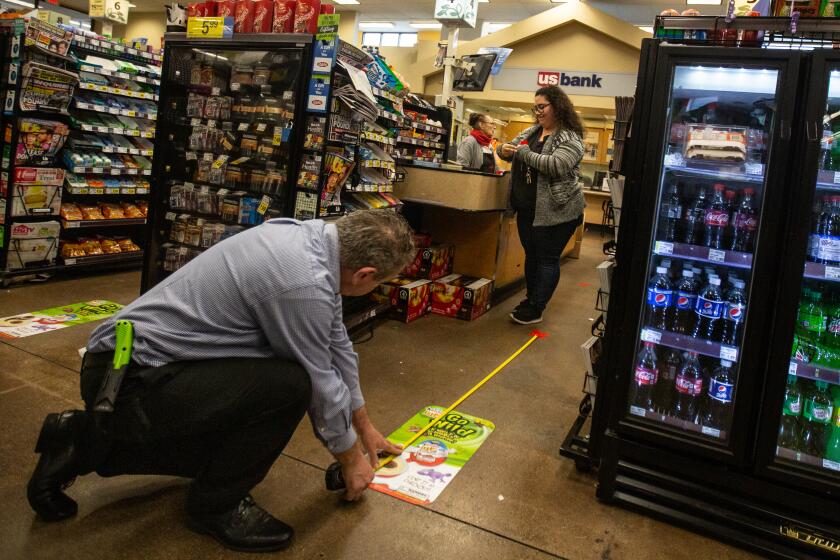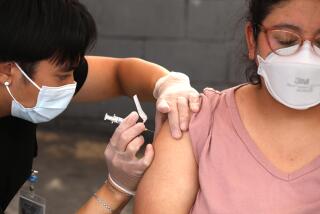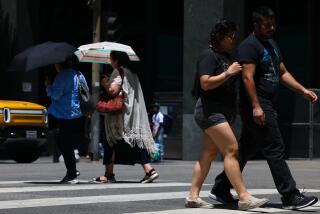COVID-19 symptoms: How can I tell if I’ve got the coronavirus?
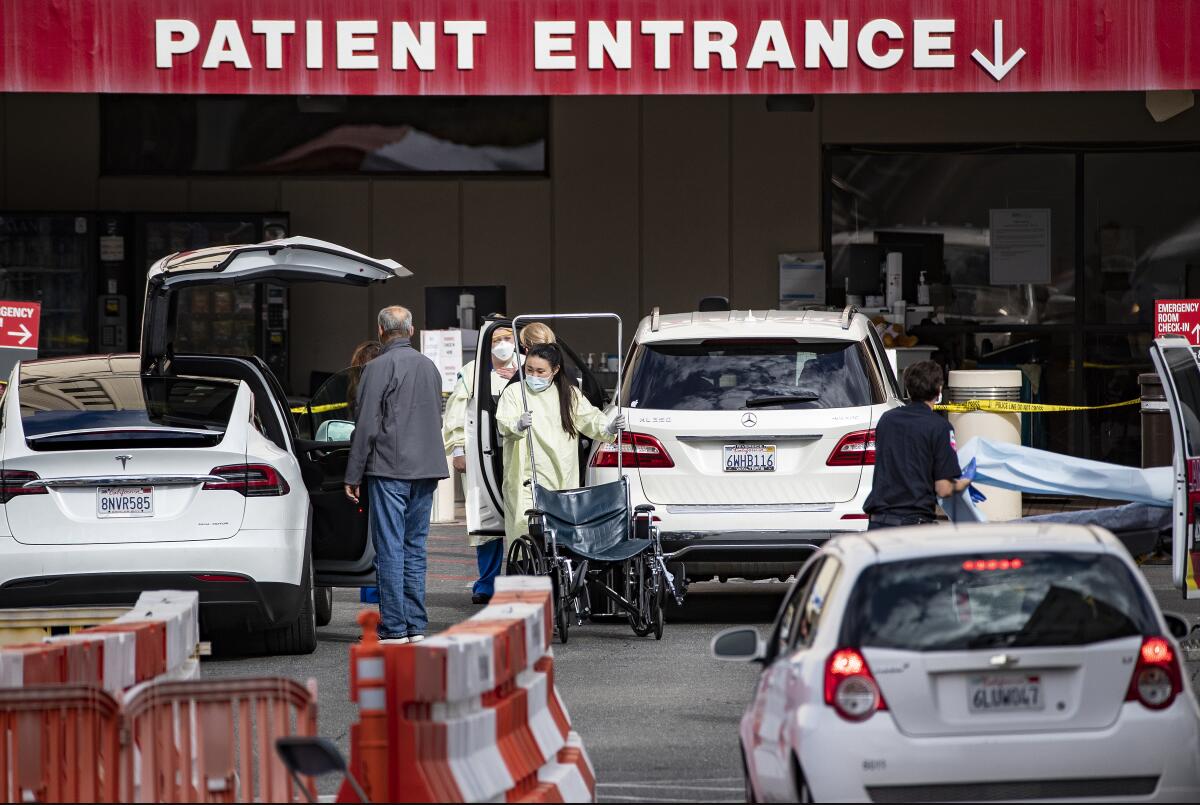
- Share via
As the coronavirus pandemic spreads, it’s hard not to be alarmed by even a stray cough.
But for people who suspect they have come down with COVID-19, the upheaval in the healthcare system is making it challenging to get a diagnosis and treatment.
Tests to confirm a coronavirus infection remain relatively scarce in California, at least for now. The state’s hospitals, like those in Italy and Spain, could soon be overwhelmed by critically ill patients.
Yet most people who get the disease do not need to be hospitalized. Their illness is mild, and their best course is to recover at home.
For anyone feeling sick and wondering what to do, here is some guidance from doctors and public health authorities.
What are the symptoms of COVID-19?
Fever, cough and shortness of breath are the common symptoms reported by patients. Chills, body aches, sore throat, runny nose, headache, diarrhea and nausea are also possible, as well as a general sensation of severe illness. In recent days, some doctors have reported seeing COVID-19 patients who had lost their sense of smell.
Could these symptoms be caused by something else?
Yes. You could have the flu, a cold, bronchitis or strep throat, among other things.
What should I do if I think I have it?
If the symptoms seem life-threatening — severe difficulty with breathing, for instance — you should call 911 right away.
If not, call a doctor for a phone consultation before you go anywhere.
To protect yourself and your healthcare providers, it’s best not to show up at an emergency room, urgent care center or doctor’s office without calling first. You don’t want to risk getting the virus if you don’t have it. You don’t want to spread it if you do.
The people with the strongest chance of developing a serious respiratory illness if they’re infected are those who are at least 65 years old, pregnant or facing other health problems such as heart or lung disease, diabetes or a compromised immune system.
If you’ve been infected with the coronavirus, the chances that you will become critically ill depend on many factors.
Depending on your symptoms, the doctor might ask you to come in to be tested for the coronavirus. In most cases, the recommendation will be home isolation.
“If you don’t have risk factors for severe COVID, odds are that you’ll recover fully without any intervention at all other than just hydration and rest,” said Dr. Rajesh Gandhi, an infectious disease physician at Massachusetts General Hospital in Boston. “It goes away by itself.”
USC’s Keck School of Medicine offers an online tool to help you evaluate your symptoms.
What is home isolation?
There is not yet a treatment or vaccine for COVID-19, so authorities urge those who become ill with it to follow strict guidelines to prevent its spread.
Most important: Stay home and don’t allow visitors.
Don’t go out until at least seven days have passed since the onset of your symptoms and at least three days since you’ve had a full recovery, with no fever and improved respiratory condition.
If you must leave home while sick, avoid public transportation if you can. The Los Angeles County Department of Public Health recommends that you use a personal vehicle.
If you need someone else to drive, leave the windows down, wear a mask if you have one and keep as much distance as possible between you and the driver.
How can I protect others in my home from catching the virus?
Ideally, you should shelter in an isolated room with a private bathroom that no one else uses while you’re sick. A caregiver can bring you food, but should leave it at the door, said Dr. James A. McKinnell, an infectious disease physician who teaches at UCLA’s David Geffen School of Medicine.
“Keep yourself supported by other people in your house as best you can,” he said. If you’re home alone, be sure someone you know well is checking in by phone at least a couple times a day, he said.
While you’re at home, you need to stay 6 feet away from others. It’s especially important to keep away from anyone who is elderly or in one of the other groups with a higher risk of serious illness.
Keep shared areas of the home well-ventilated; open windows or run a fan or air-conditioner if you can. Don’t handle pets while you’re sick, don’t prepare food for others, and don’t take care of children if you can avoid it. Wash your hands often, with soap and water for at least 20 seconds.
When you cough or sneeze, cover your mouth and nose with a tissue, throw it away in a lined trash can and wash your hands right away.
Don’t share dishes, cups, glasses, utensils, towels or bedding with other people or pets. Wash them thoroughly with soap after use.
Do I need a face mask?
If you are sick, yes. The U.S. Centers for Disease Control and Prevention says you should put one on whenever you’re around other people and before you enter any healthcare facility.
When caregivers enter a sick person’s room, they should wear a face mask too.
But if you’re not sick, you’re not taking care of anyone who is sick and you’re not working in a healthcare setting, a mask is not necessary.
As the number of coronavirus cases continues to increase, you may be wondering whether you should be wearing a mask when you leave your home.
Do I have to clean the area where I’m recovering?
Yes — and very thoroughly.
You should clean high-touch surfaces in your “sick room” and bathroom every day if you can, wiping them with disinfectant. That includes bedside tables, remote controls, phones, tablets, keyboards, counters, tabletops, doorknobs, light switches, toilets and faucets.
Coronavirus: Here are the rules now that Newsom has ordered all Californians to stay at home
Let someone else clean the home’s common areas. If a caregiver is needed to clean your “sick room” or bathroom, they should wear a mask and wait as long as possible after you’ve used the bathroom.
“You have to imagine that this virus is on every single surface around you,” McKinnell said. “If you touch something — anything — you have to now assume the virus is on your hand.”
What should I do if my symptoms get worse?
Seek prompt medical care, especially if you’re in a high-risk group.
The most worrisome sign, McKinnell said, is when someone who has been sick for four or five days starts feeling worse instead of better.
“When you start to feel like, ‘I can’t get out of bed,’ that’s a major transition point to me,” he said.
Warning signs include difficulty breathing, persistent pain or pressure in the chest, confusion, inability to get up, or bluish lips or face, according to the CDC.
What might help me get better?
Rest, drink plenty of fluids and eat nourishing food. Acetaminophen, or Tylenol, can reduce fever and pain. Ibuprofen is fine too, doctors say.
“All the things our mother told us in terms of staying healthy — they were right before, and they’re right now,” Gandhi said.
